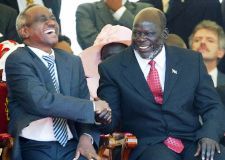Sudan’s Second VP arrives for talks with southern leaders
JUBA, Sudan, Aug 9, 2005 (AP) — Sudan’s Second Vice President Ali Osman Taha arrived in the south Tuesday to reassure former rebel leaders that the government is committed to implementing the agreement to end Africa’s longest-running civil war, despite the sudden death of former rebel leader and recently appointed First Vice President John Garang.

|
|
Sudanese vice president Ali Osman Mohammed Taha, left, and John Garang, chairman of the Sudanese People’s Liberation Army share a joke before they signed the Comprehensive Peace Agreement, Sunday, Jan 9, 2005 at Nyayo stadium in Nairobi, Kenya. (AP) . |
Taha, who with Garang negotiated key parts of the deal that brought the 21-year civil war to an end, was expected to meet Garang’s successor, Salva Kiir Mayardit in this Nile River port city, said government spokesman Said al-Khatib. Taha didn’t attend Garang’s funeral Saturday because the government delegation was led by President Omar el-Bashir.
Kiir is expected to go to Sudan’s capital Khartoum Wednesday to be sworn in Thursday as first vice president of the unity government being formed under the deal to end the conflict between the Arab Muslim-dominated government and rebels in the African Christian and animist south.
Kiir will also be installed as president of the autonomous government that will run southern Sudan until the region holds a referendum on secession in six years.
While in Juba, Taha was also scheduled to meet Garang’s widow and lay a wreath at his grave. The former rebel leader died in a helicopter crash on July 30, three weeks after taking office as Sudan’s first vice president and president of the autonomous southern Sudan.
“I came here to give my condolences to the family of Garang and the SPLM leadership,” Taha said on the tarmac of the Juba International Airport.
Meanwhile, experts have began investigating the helicopter crash that killed Garang and 12 others in southern Sudan, a U.N. official said.
U.N. military observers have set up camp near the crash site to monitor the work of the experts, said Maj. Kim Reisz of the U.N. mission in Sudan.
Garang’s sudden death and the days of violent clashes that followed have raised fears about the country’s stability and the future of the peace deal signed in January. His charismatic – and sometimes strong-handed – leadership was considered essential to making the agreement work.
Garang’s death prevented the current government and his Sudan People’s Liberation Movement from meeting Tuesday’s deadline to name members of the Cabinet in the national unity government. The two sides will discuss a new date for naming members of the government, SPLM officials said.
